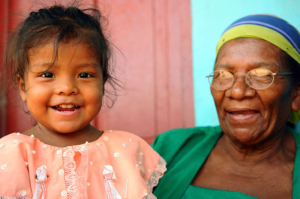Humidtropics Bridges Information Gap
 Rural communities in Central America and the Caribbean make farming and natural resource management decisions under risky and uncertain conditions. Local knowledge systems are proving to be insufficient for the decision-making process, and outside information is not consistently available when farmers need it.
Rural communities in Central America and the Caribbean make farming and natural resource management decisions under risky and uncertain conditions. Local knowledge systems are proving to be insufficient for the decision-making process, and outside information is not consistently available when farmers need it.
In some cases, local knowledge systems have been disrupted by local politics or imperial intervention. In other cases, new challenges presented by climate change and increased demand for volume and quality require better dissemination of information.
Fortunately, Humidtropics, a CGIAR research program, has stepped up to help poor farm families across the tropics to boost their income through better, integrated agricultural systems’ intensification, while also preserving their land for future generations.
To help bridge this information gap and provide small-scale, rural farmers with necessary, relevant information, scientists with Humidtropics have created four digital libraries with information about sustainable coffee production, sustainable livestock production, Nicaraguan public policies and rural women.
These themes were chosen based on research by partner organizations in the area. Over several years, researchers chose 300-500 books, manuals, technical reports and scientific articles which are publicly available. The resources are organized by year, theme and source to make them easy to use. The information has now been distributed to the computers of the 50 partner organizations in Mesoamerica.
In 2015, Humidtropics hopes to build more digital libraries and to continually refine the information that is included in each.
Currently, the humid tropics are home to 2.9 billion people, the majority of whom are poor farmers. Combined, these farmers have about 3 billion hectares of land, which are critical to local, and global, food supplies, as well as global biodiversity.
– Claire Karban
Sources: International Center for Tropical Agriculture, Nicanorte, CGIA
Photo: Wikimedia Commons
